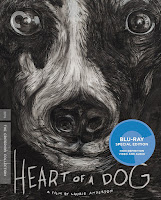- Details
-
Parent Category: Film and the Arts
-
Category: Reviews
-
Published on Tuesday, 22 November 2016 18:03
-
Written by Kevin Filipski
Blu-rays of the Week
Akira Kurosawa’s Dreams
(Criterion)
One of Japanese master Akira Kurosawa’s most vividly visual filmscapes, this episodic 1990 fantasy doesn’t connect in any way but its stories are heartfelt—if at times diffuse—reminders of how life on this planet is both precious and filled with man-made horrors.
The best segments, at the beginning and end, present Kurosawa’s singular cinematic vision at its most colorful: the middle segment, on Vincent van Gogh (with Martin Scorsese miscast as the painter), gloriously bursts into dazzling primary colors. Criterion’s excellent release comprises an eye-poppingly beautiful hi-def transfer; Stephen prince commentary; Making of “Dreams,” a 150-minute on-set documentary; Kurosawa's Way (2011), a 50-minute feature with many filmmaking admirers discussing Kurosawa; and new interviews with assistant director Takashi Koizumi and production manager Teruyo Nogami round out this excellent set.
J’accuse
(Olive Films)
In Christopher Hampton’s choppy 1995 biopic Carrington, Emma Thompson embracingly embodies the title character, whose love for avowed homosexual writer Lytton Stratchey (a powerful Jonathan Pryce) was forever unrequited; Hampton gets much right, but he meanders too often to no discernable point.
Abel Gance’s J’accuse, a strong but strident 1938 anti-war tract, showcases several formidable actors (Victor Francen, Jean-Max, Line Noro, Paul Amiot) who point Gance’s polemic in the right direction. Both films have nicely restored transfers.
(Olive Signature)
This 1971 revenge western stars a comely but wooden Raquel Welch as a frontier woman who survives a rape by three outlaws, then tracks them down after they kill her husband in cold blood. Director Burt Kennedy is unsure whether he’s making an exploitation flick or a serious drama about a woman’s degradation and redemption, ending up in a no man’s (or woman’s) land uneasily poised between two extremes.
Robert Culp is gamely appealing as the hired gun who helps Hannie, while Ernest Borgnine, Strother Martin and Jack Elam are an appropriately despicable bunch of hombres. The film looks quite good on Blu-ray; extras are adirector Alex Cox (Walker, Repo Man) commentary and two featurettes.
Looking—Complete Series and Movie
(HBO)
This HBO series about a trio of gay men who are close friends explores their relationships, both platonic and intimate, over the course of two seasons and 16 episodes—along with a full-length film which reunited the friends a year later at a wedding.
The five-disc Blu-ray set brings together all of the episodes and the film, all showcasing the rich, sensitive performances in the leads by Jonathan Groff, Frankie J. Alvarez andMurray Bartlett. The hi-def transfers are first-rate; the 16 episodes contain audio commentaries.
(Criterion)
Marlon Brando’s lone directing effort was this overambitious 1961 western in which he plays a gunslinger who, after going to prison because of his partner’s betrayal, spends the rest of the long movie getting his ultimate revenge. The always-charismatic Brando is never less than watchable, Karl Malden fine as his nemesis and Slim Pickens steals scenes as Malden’s lackey, but there’s a huge hole left by Pina Pellicer’s amateurishly stiff performance as the woman Brando loves.
It’s undeniably gorgeous to look at, as Charles Lang’s splendid cinematography gains in color and detail in Criterion’s restored hi-def transfer. Extras include a Martin Scorsese intro, Brando voice-recording excerpts made during production and video essays on Jacks’production history and Brando’s making a western.
Capital
Syndicate—All or Nothing
Wentworth
(Acorn)
The acting is the main thing is two new British television series, as well as one from Down Under. Capital is a clever drama tinged with mystery and paranoia, helped along by an ace cast led by Toby Jones, Rachael Stirling, Lesley Sharp and Gemma Jones; Syndicate—which follows the servants at a ritzy mansion who win the lottery—features a stellar ensemble headed by Alice Krige, Polly Walker and Anthony Andrews.
The intense Australian prison drama Wentworth—emphatically not a rip-off of Orange Is the New Black—also features a plethora of superb performers: Danielle Cormack, Nicole da Silva, Kris McQuade, Leeanna Walsman and Kate Atkinson. Wentworth extras include an hour of on-set featurettes and several interviews.
The Childhood of a Leader
(IFC)
Actor Brady Corbet’s haunting directorial debut, a Fascist allegory for our time, is an absorbing tale of a rambunctiously wild child—son of an American ambassador in Europe—who quickly discovers that he can have his way at any cost, including the lives of his parents.
Although the finale unsubtly depicts the adult leader beginning his reign in front of cheering crowds—the showy camerawork and blatant score are showy undercut the power of the images—overall, this is an unsettling and pertinent expose, which features a brilliant performance by Berenice Bejo as the boy’s mother.
Lo and Behold—Reveries of the Connected World
(Magnolia)
Another of German director Werner Herzog’s endlessly fascinating documentaries—as opposed to his trite and unconvincing fictions—is this playfully serious study of how the virtual world has encroached on the real one, most likely to our ultimate peril.
As usual, Herzog seeks out the most interesting if unlikely people to talk with, all in his own, charmingly accented English; that inimitable voice also provides the alternately amused and bemused narration. Lone extra is a Herzog interview.
Arthur Honegger and Jacques Ibert—L’Aiglon
(Decca)
Two master French composers did that rare thing, joining forces to collaborate on an opera. The unsurprisingly tuneful but surprisingly coherent result (musically and dramatically) contains both charming and intense music, with a flavorful libretto based on Edmund Rostand’s play about Napoleon’s son.
This recording—conducted by Kent Nagano, leading a lovely performance by the Montreal Symphony Orchestra—gets all the little details right and builds the opera to a taut finale; there’s exquisitely idiomatic singing by sopranos Anne-Catherine Gillet and Helene Guilmette and baritones Marc Barrard and Etiene Dupuis. Too bad this rarity—first performed in 1937 then infrequently done since—wasn’t given a staging that we could watch on DVD or Blu-ray.

































